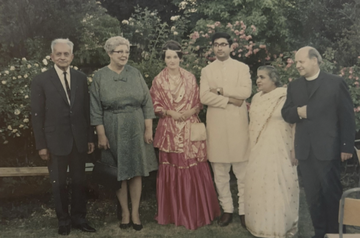
Families and Relationships
South Asians have forged relationships and built families throughout Britain, from the 1600s onwards
Overview
During the long period South Asians have been in Britain, they have established many types of relationships. These have changed over time; earlier, these relationships were often transient. For example, lascars (sailors or seafarers) and ayahs (nannies) came to Britain as early as the 1600s, with their numbers increasing in the early to mid-1800s. Whilst small numbers remained in Britain, most returned home after short stays and living on the margins of society. They often experienced destitution and deprivation, seeking refuge in lodging-houses, sailors’ homes or Ayahs’ Homes. Students from the subcontinent also came and went from the 1800s. During their time in the UK, these individuals formed relationships among society, with employers and educators, activists and supporters, as well as those of a more intimate nature.
Alongside these encounters in passing, longer-term relationships flourished, and families formed and settled in Britain. In the early nineteenth century, aristocratic families such as those of Hellen Marion Rundheer and Maharaja Duleep Singh made home in England. Later, from the 1930s onwards, working-class men arrived in the UK and eventually brought their families over from the subcontinent. These families settled in all four nations, and include the Sumra and Chada families in Northern Ireland, Ghulam Sarwar Khan Chohan in Middlesbrough and Shahida Ali’s father in Glasgow.
South Asians in the UK married interracially – the Bedi (1933) and Chohan relationships being early examples. More recently, in their separate oral history interviews, Nisha Obano talks about marrying a man of Nigerian descent whilst Lata Sharma describes finding love with a Northern Irish man (full interviews available at the British Library). Historically, mixed marriages were often met with condemnation, as evidenced in the India Office Records (British Library, IOR/L/PJ/8/714). These marriages nevertheless bore children of mixed heritage.
Bringing families together, and keeping them together, has been at times contested and fraught with complications. This is often owing to immigration policies that have become more restrictive. British organizations, like the Indian Workers’ Association and Asian Youth Movements, have campaigned against deportation and family separation to help families like that of Anwar Ditta. Others have sought to address indignities experienced by those wishing to reunite or form families. Southall Black Sisters and OWAAD campaigned against the 1970s invasive virginity testing practices at Heathrow Airport. During the same period, in 1972, following the Ugandan expulsion order, the Ugandan Resettlement Board helped rehouse families on their UK resettlement from East Africa.
There have been and continue to be lesser-known relationships in circulation. For example, organizations like the Black Lesbian and Gay Centre (1985), Shakti (1988), Club Kali (1995), Glitter Cymru (2016) and Bollyqueer (2021) have provided safe spaces as well as advocated for LGBTQIA+ members of the South Asian community. Some members of this community, including DJ Ritu, Vinay Jobanputra and Numair Masud, have drawn upon their minoritization as queer South Asians to help racially minoritized LGBTQIA+ people to build safe and comfortable lives in Britain.
Another interesting thing
Governmental policy has impacted families and relationships. Met with controversy, the Commonwealth Immigrants Act 1968 was an amendment to the 1962 Act. It aimed to further restrict the right of Commonwealth nationals to migrate, live and work in Britain by allowing right of entry to only those who were born in Britain, as well as their children and grandchildren. The 1968 Act was introduced against the backdrop of Kenyan independence, which led to British passport-holding Kenyan South Asians resettling in the UK. The policy was enacted to prevent the twice migration of South Asians to the UK from East Africa, including from Kenya and later impacting Ugandan Asians (1972). In some instances, the ramifications of the Act included families being separated across the world, with one member being eligible to enter to the UK and another not.
